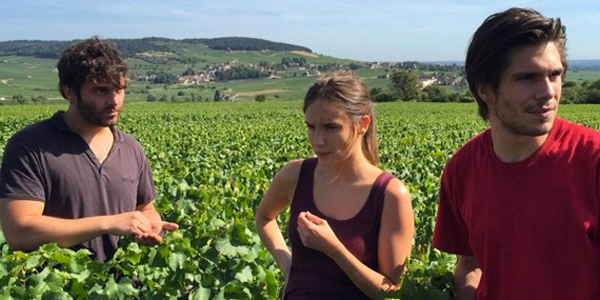Reviewed by GREG KING
Director: Cedric Klapisch
Stars: Pio Marmai, Ana Girardot, Francois Civil, Jean-Marie Winling, Maria Valerde, Yamee Couture, Jean-Marc Roulot, Eric Caravaca, Tewfik Jallab, Bruno Raffaelli, Hugo Soyer.

Set in the wine growing region of the Loire Valley over the course of one year, this French drama is a tale of family, relationships, the ties that bind us, and, of course, wine.
Raised on a vineyard in Burgundy with his siblings, Jean (played by Pio Marmai) left home a decade ago to travel the world and also to escape from the presence of his domineering father. He ended up in Australia working on his own vineyard and marrying and settling down with his new family. But when he learns that his father is dying, the prodigal son returns home and attempts a reconciliation with his estranged family.
Juliette (Ana Girardot) now runs the business although she lacks confidence in her abilities, while younger brother Jeremie (Francois Civil) has married the daughter of a rival wine maker. The reunion is far from a happy one though as his brother and sister harbour some resentments over his failure to return home to attend their mother’s funeral five years earlier and the lack of contact during his absence.
But then the three learn that they have to pay almost half a million euros in inheritance taxes. Each of the siblings is an equal owner of the vineyard following their father’s death, and all must agree on a course of action. They are reluctant to sell off their inheritance or break up the vineyard, but need to come up with a viable solution. Anselme (Jean-Marie Winling), Jeremie’s wealthy and overbearing and condescending father-in-law is keen to buy some of the land and he has big plans for the property.
Jean stays to help with the upcoming harvest and reconnect with the land. But his prolonged stay here puts increased pressure on his already difficult relationship with his wife and young son who live on the other side of the world.
Back To Burgundy (aka Ce Qui Nous Lie, which roughly translates as Which Binds Us) is the latest film from French filmmaker Cedric Klapisch, better known for his so-called Spanish trilogy. His films have often followed ordinary characters and their struggles. He co-wrote the script with Argentinian screenwriter Santiago Amigorena (A Few Days In September, etc) and Jean-Marc Roulot (Haute Cuisine, etc), and they have developed well-rounded characters who are fleshed out in detail. The film also explores the complex and troubled relationship between the three siblings and each of them gets their own distinct character arc. There are several brief flashbacks to their happy childhood when their father educated them in the process of wine making and wine tasting. The film also explores in some detail the challenges of running a vineyard.
Klapisch brings a natural observational quality to those scenes depicting the process of the harvest, and he captures the enormous work ethic of a vineyard, as well as depicting the winemaking process in detail, with the picking of the grapes and the enthusiasm of the casual workers brought in for the harvest. The film was shot over the course of twelve months to gain an appreciation of the different seasons and the work required to produce a vintage wine.
Klapisch researched the subject thoroughly and he even worked a grape harvest himself in order to better understand and appreciate all the nuances of the process. The film has been beautifully shot in widescreen and on location by cinematographer Alexis Kavyrchine, who has worked on both documentaries and fictional dramas. Her visuals are at times quite seductive, and she brings an almost documentary like realism to elements of the film.
The three main leads develop a palpable and engaging chemistry that holds the film together.
The film runs for a generous 113 minutes, and it seems a little long. When it is detailing the specific process of harvesting and wine making the film is interesting, and the attention to detail is impressive. However, much of the drama seems a little episodic and repetitive in nature. And there are some scenes that smack of unnecessary padding.
However, Back To Burgundy is a rather low-key affair and lacks the edgy quality and dramatic tensions of 2011’s You Will Be My Son, another French film set on a winery, which dealt with the fractious relationship between a vintner and his son.
★★☆



